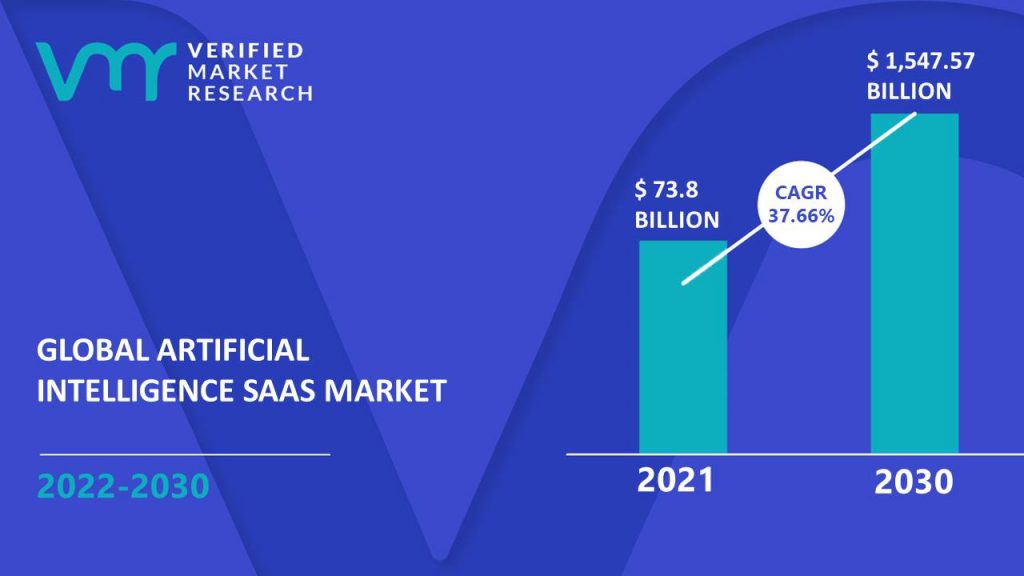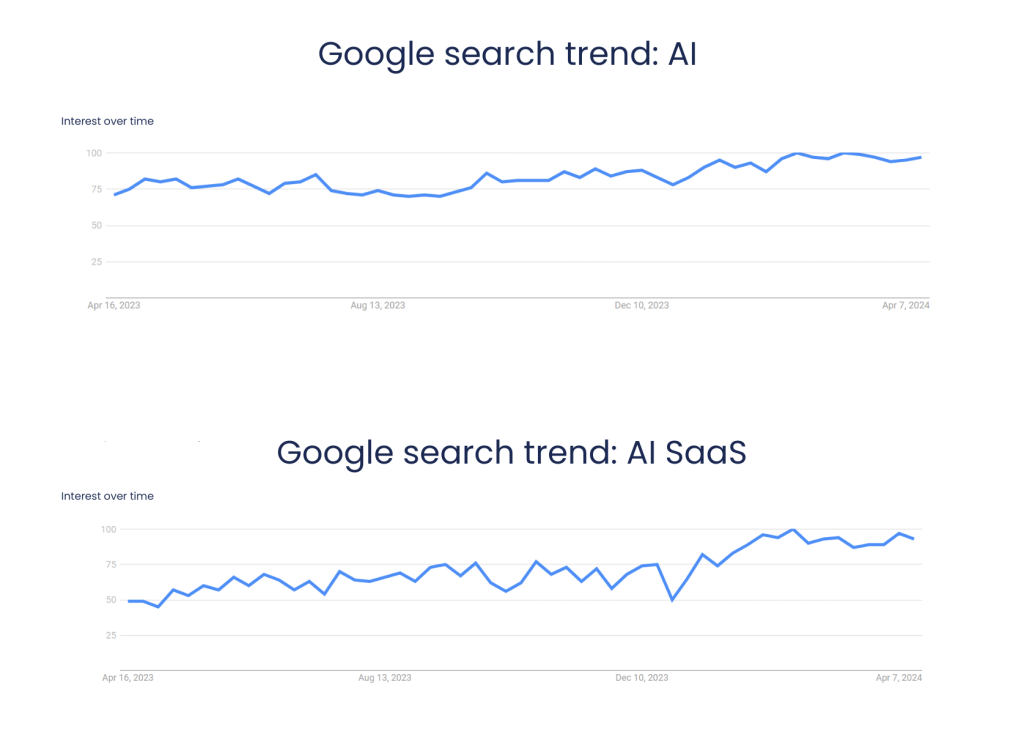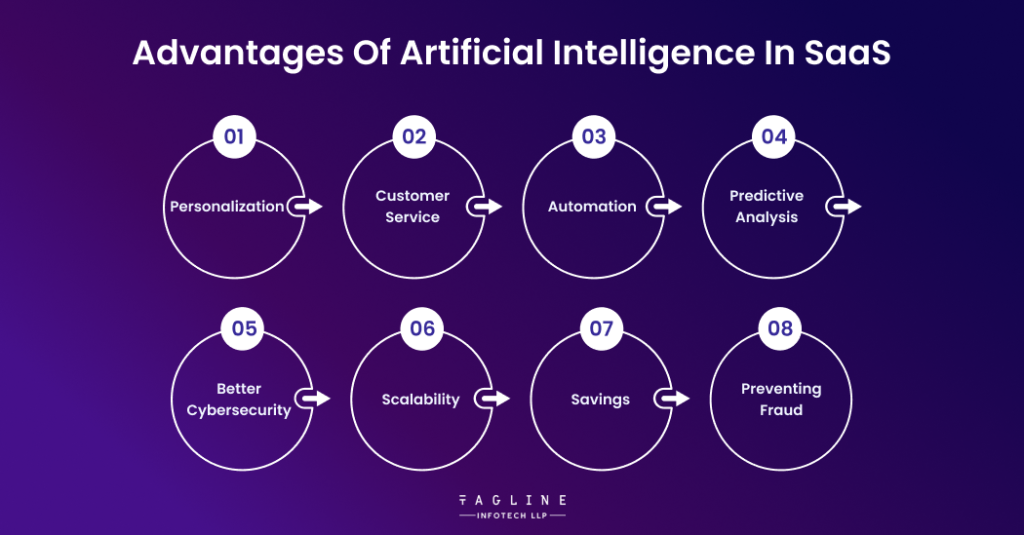Artificial Intelligence (AI) is not a novel concept or technology anymore. However, when OpenAI launched Generative Pre-trained Transformer 3 (GPT-3) in 2020, it led to a huge disruption. Ever since then, there has been a massive explosion of AI tools and AI-powered tools.
The emergence of platforms like ChatGPT (GPT-3.5 and GPT-4) and Gemini (formerly known as Bard) made AI more mainstream. Suddenly, everyone started discussing AI and its possibilities.
As a result, the internet is now flooded with literature on the scope, benefits, threats, and all other aspects of Artificial Intelligence. Will AI take away jobs? Will AI replace developers? When do you think AI will wipe out every SaaS (Software-as-a-Service) company?
Yes, you read the last one right! This is a question asked by a curious netizen on a popular social networking and community platform. This question caught our attention and inspired us to make it the topic of our article.
So, here we are. In today’s blog piece, we will explore the future of the software industry and the hold of AI and SaaS in that landscape. So, stay tuned with us and discover who will win this clash of titans. Let’s dive deeper and find out.
Suggested Read: ChatGPT and App Development: Here’s all you need to know
In this blog
- AI vs SaaS market: A statistical overview
- Synergy or Standoff? What is the equation between AI and SaaS?
AI vs SaaS market: A statistical overview

Statistics, facts, and market projections can tell a lot about where an industry is headed. The key to understanding the fate of the SaaS and AI market also lies in studying the numbers. Therefore, we have compiled a list of facts and statistics that paint a picture of the SaaS and AI market. Go through them below:
- In 2023, the software as a service (SaaS) market was estimated to be worth approximately 197 billion US dollars. It is estimated to reach a whopping value of 232 billion US dollars this year.
- The Software-as-a-Service industry has been on a constant uprise. As per studies, the SaaS market has increased in size by around 500 percent in the last seven years.
- The AI market size is projected to reach 184 billion US dollars in 2024. It is expected to grow at a CAGR (2024-2030) of 28.46 percent resulting in a market volume of 826.70 billion US dollars by 2030.
- The United States is the biggest SaaS and AI market. It has around 8x more SaaS companies than any other country. It is also the largest AI market that is estimated to be around 50.16 billion US dollars this year.
- AI has started powering SaaS and the two technologies together will play a significant role in shaping the software industry. The global AI SaaS market is predicted to grow at a CAGR of 37.66 percent between 2021 to 2030. It is expected to reach a value of 1,547 billion US dollars.
- According to a survey conducted by Future of SaaS, more than 53 percent of SaaS businesses plan to integrate AI into their operations in 2024.
- As per Statista, the top three leading industries in SaaS by the number of companies are artificial intelligence software, analytics software, and financial services software.
As evident by the numbers ahead, SaaS and AI are two powerful industries poised for immense growth and expansion. However, instead of a standalone rise, the two technologies are expected to gradually join forces and emerge as a totally new market that is being termed as AI SaaS or AI-powered SaaS.
Suggested Read: All you need to know about reseller SaaS partnerships
Synergy or Standoff? What is the equation between AI and SaaS?
Is AI a threat to SaaS? Will AI take over SaaS? Will SaaS businesses shut off due to AI explosion? Can AI and SaaS exist together? Should I introduce AI in my SaaS business?
We understand that you are here to find answers to these questions, and we will address the same. But first, let us understand what AI and SaaS are.
What is AI?
AI or Artificial Intelligence can be broadly defined as the intelligence exhibited by machines, especially computers. AI is being used to power expert systems, natural language processing, speech recognition, and other advanced and emerging technologies.
From predictive text and face recognition features in phones to smart cars and digital shopping assistants, AI technology is all around us. It is powering more devices and systems than ever and is steadily becoming a part of our everyday lives in ways that are hard to imagine.
What is SaaS?
SaaS stands for Software-as-a-Service. As the name depicts, it is a method for software licensing and distribution. Unlike regular software that is bought and installed on our systems, SaaS is accessed online through a subscription. It is often cloud-based and centrally hosted.
SaaS products and services are now available in all shapes and forms. From entertainment platforms like Netflix to our advanced no-code free app builder AppMySite, SaaS is being used by individuals as well as businesses and organizations around the world.
AI or SaaS: What is the future?
Now that the two concepts are clear, let us comprehend their dynamics and assess what the future holds.
It is true that ChatGPT-3.5 and the buzz around its launch created waves in the software industry. Almost every tech expert and every business centered around software had at least some concerns about their future. However, the pandemonium has now died down to a huge extent.
Does this mean that AI is headed for a slump? Certainly not. AI is poised to become mightier and more popular in the coming days. It is empowering almost every industry out there and will become more mainstream in the future.
However, all the talk about AI replacing jobs and tech companies surely seems like an extrapolation (at least for now). The same applies to SaaS companies as well.
It is true that almost every innovation and invention cause some disruption and challenge the status quo. However, to state that the explosion of AI is an impending doom is an overstretch.
On the contrary, the trends show that AI is making the SaaS industry more powerful. As we discovered in the statistics section above, the SaaS industry is openly embracing AI and incorporating generative AI tools to make their systems more streamlined, automated, and powerful.

Google trends also show that the interest in ‘AI SaaS’ is rising alongside the interest in ‘AI’ technology alone.
Thus, we can safely assume that the two technologies are not at war per se. Instead of getting into a tussle or ‘standoff’, AI and SaaS are working and will continue to work in synergy in the coming time. We can say that we are headed toward a future of AI-powered SaaS.
Conclusion
It is a given that a stagnant approach can make any business obsolete. Thus, they should always be open to incorporating new and emerging tech and this applies to the SaaS industry as well.
This is the time where one must leverage AI technology to increase their potential and most SaaS businesses are doing just that. All one really needs to do is take a calculated approach and think of ways to continue to innovate and expand.
Suggested Read: How to build an AI app? Beginner’s guide to AI app development
Benefits and Challenges of using AI in SaaS
Now we know that AI and SaaS are joining forces to become one powerful technology. AI technologies are being offered as a service, giving rise to a whole new concept and market of AI-as-a-service.
Additionally, SaaS companies are leveraging AI technology to make their existing software more powerful and their business operations more streamlined.
However, it is important to be aware of the advantages as well as the challenges and downsides of incorporating Artificial Intelligence in your SaaS business. In this section, we will explore the same.
Benefits of using AI for SaaS business
AI can overhaul the potential of a business and increase it limitlessly. Here are the merits of integrating Artificial Intelligence with your SaaS business:
Increased automation and efficiency
AI technology and tools can power, automate, fast-track, and amplify several segments of your business. This includes regular workflows, employee management systems, customer service and chat support, product UI/UX design, software development and deployment cycles, and more. Thus, it can increase your business efficiency, save resources, and maximize your output.
Insightful data collection
AI can help SaaS platforms collect large volumes of insightful data. These insights can be further segmented based on one’s needs and used to make informed business decisions, optimize workflows and processes, identify trends, and so on. It can also be used to make developments to the product and enhance customer experiences.
In-depth personalization
As AI allows you to study consumer behavior and patterns, it increases the scope for personalization. In fact, AI can take your personalization game several notches up and enable you to create highly targeted and tailored content and product experiences. This ultimately results in increased engagement and retention.
Advanced predictive analytics
Advanced AI predictive technologies can be used by SaaS companies in many ways. It can help you predict everything from consumer behavior to market trends. AI can also help you detect the flaws, shortcomings, and threats in your system and help you overcome them. This saves any downtime or hazard.
Robust scalability and growth
Implementing AI in your SaaS business can give you an edge over your competitors who are yet to do so. It also saves you hours that are otherwise spent on grunt work and repetitive tasks. Eventually, it gives you time to focus on more productive aspects of your business thereby powering scalability and growth.

Challenges of using AI for SaaS business
Not every business is equipped to embrace AI and harness its full potential. Here are the demerits of using AI technology for your SaaS business:
Complexity and resource-demand
It is not easy and feasible for every business to integrate AI smoothly into their existing systems. From addressing infrastructural and technical complexity to finding the desired talent and resources within one’s budget, there are many challenges to overcome. The demand and supply gap of skilled professionals in this area is also a huge hindrance to the widespread adoption of AI.
Privacy and security concerns
AI derives most of its strength from data. However, not every business has the infrastructure and means to handle large volumes of data securely. This gives rise to security and privacy concerns. Ensuring compliance with data protection policies and regulations like GDPR can also be tricky for some businesses. Besides, bias, lack of accountability, and flawed output are also a concern that entails generative AI.
Apprehension and limitations
AI is a complex concept that is not comprehensible to everyone. This gives rise to the fear of the “unknown” among the small businesses that have limited means. In fact, it is hardly possible to fathom the exact scope of AI as it is continuously evolving. Thus, it is common for businesses to feel anxious and overwhelmed about the full-fledged adoption of AI. This limits the implementation of artificial intelligence systems within legacy SaaS frameworks.
Wrapping up
That was our viewpoint on the AI vs SaaS battle. It is evident that AI and SaaS need not be exclusive to each other. Like any other technology, SaaS is embracing Artificial Intelligence and SaaS businesses and companies are integrating generative AI and ML (Machine Learning) into their systems.
AI will not eradicate the SaaS industry. On the contrary, technologies like NLP (Natural Language Processing) will further strengthen the SaaS sector and lead to new innovations in the software industry. From mobile app development to blockchain, and eCommerce to agriculture, it will transform every industry.
However, you do not need to be overwhelmed with the changes going on around you. Chalk out your business goals and needs and move ahead accordingly. There are many SaaS companies out there that can help you. If you are a SaaS business yourself, continue to scale and adopt technologies that are viable and feasible.
Frequently asked questions
What is AI SaaS or AIaaS?
SaaS or Software-as-a-Service is a subscription-based model of software licensing and distribution. Whereas AI SaaS or AIaaS (Artificial Intelligence as a Service) is where an AI-based product is offered as a service to consumers. AI SaaS allows other businesses or organizations to train, deploy, and manage machine learning models for various business processes.
Note that AI in SaaS can have a different connotation than AI SaaS or AIaaS. While AI SaaS is a service itself, AI in SaaS can be defined as any form of usage of Artificial Intelligence technology for a SaaS business. For example, a SaaS business could be using an AI tool simply to automate any workflow within their business and not necessarily offering it as a service to their customers.
Can AI and SaaS work together?
Yes, the rising trends of AI disruption in the SaaS market show that AI and SaaS can work together. Many SaaS-based businesses are adopting Artificial Intelligence to enhance their operations, productivity, and efficiency. From automating and expediting tasks to reducing errors that are common in human-powered systems, AI is allowing SaaS companies to amp up many areas of their operation. This shows that AI and SaaS can work together and help businesses grow and scale beyond limits.
How to use AI for SaaS business?
The use of Artificial Intelligence for SaaS depends on the specific goals of the business. For example, some businesses may want to automate their marketing campaigns and trigger posts and emails based on user behavior predictions; others may want to implement chatbots that can capture leads and offer enhanced customer support. It depends on the needs of the company. Some examples and use cases of AI in SaaS are as follows:
- Website and app development: Generating website pages or app screens based on prompts.
- Project management: Automating and streamlining workflows, planning projects, managing resources, and more.
- Customer support and assistance: Conversational marketing and support based on NLP (Natural Language Processing).
- Customer relationship management: Analyzing customer data and predicting behavior for curating personalized journeys.
- Marketing and promotion: Segment audience data and automate marketing campaigns and content based on data intelligence.
What are the risks associated with using AI in SaaS?
Every technology comes with potential risks and hazards. Using AI in SaaS can also give rise to certain challenges. Some common risk factors associated with the same are as follows:
- Challenge of securing and handling large volumes of data
- Ensuring user data privacy and encryption
- Biased, flawed, and unreliable output
- Risks of unethical decision making
- Lack of definite accountability
What are the top SaaS companies leveraging AI?
Several SaaS companies are leveraging AI to enhance their services. Here are some best examples of SaaS companies using Artificial Intelligence:
- Netflix: The streaming platform uses AI for personalized content recommendations.
- HubSpot: It is a marketing tool that utilizes AI to automate marketing efforts.
- Slack: It is a business software that streamlines workflows and productivity via an AI-powered chatbot.
- Dropbox: It uses AI to enhance search functionality and organize content for users.
- DocuSign: The tool leverages AI to automate signature verification processes and secure documents.
What industries will benefit from AI-powered SaaS solutions?
AI-powered SaaS is already powering several industries and sectors like retail, healthcare, travel, education, marketing & communication, manufacturing, and so on. With time, the influence and use of AI-powered SaaS tools will increase in these industries. It will also impact businesses related to banking and finance, food & beverage, and so on.
How can SaaS businesses get started with implementing AI?
There is no universal approach to adopting AI for your SaaS company. It depends on your goals and the scope of your business. You can start with research and identify where and why you want to implement AI. For example, you may want to automate software development, enhance customer support, and so on. Compile data if needed and train AI models accordingly. Alternatively, you can simply opt for regular SaaS tools that fulfil the same purpose. For example, if you want to fast-track app development within your agency, you can subscribe to AppMySite’s white label app builder that enables no-code and DIY app development within minutes.
